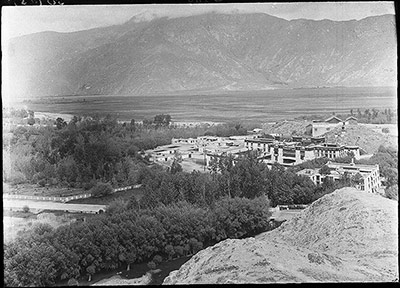
1998.285.296.1 (Glass negative)


1998.285.296.1 (Glass negative)

Rabden Lepcha?
Sir Charles Bell
1920- 1921
Lhasa > Kundeling
1998.285.296.1
120 x 163 mm
Negative glass plate gelatin , Negative Half Plate
Donated 1983
St Antony's College, Oxford.
Lantern
Sir Charles Bell's Mission to Lhasa 1920-21
Royal Central Asiatic Society
H.269
BL.H.269
Manual Catalogues - Bell's List of Illustrations entry: "[No. of chapter] L. [Subject of Chapter] Lhasa [Subject of Illustration] H.269 (as) Kundeling monastery, Lhasa, in summer. The houses of the author and his staff were in their park (lingka). Two of the recent heads of this monastery have been Regents of Tibet. [Remarks] L.249"
Other Information - Setting: Bell's Diary for July 1st 1921:"Kennedy and I visit Kundeling today. There have [been] ten previous reincarnations. Those that died in Lhasa have their mausolea here; those that died in Kham have their mausolea there. The 9th acted as Regent of Tibet for eleven years during the boyhood of the present D[alai] L[ama], but died when 34 years old, having assumed the Regency when he was 23. One, if not more, of the others has also acted as Regent of Tibet. // At present there is no incarnation, the lat having "gone to the heavenly fields" a year or two ago. I ask whether the last Lama, before departing for the heavenly fields gave any indication as to where he would reincarnate. "No very clear indication" is the reply; "The All-knowing (D[alai] L[ama]) will decide when the time comes." " [Diary Vol. XI, pp. 26-27]
Other Information - Background: Richardson mentions this site in High Peaks, Pure Earth , London, Serindia Publications, 1998, p. 303. "The monastery of Kun-bde-gling (1936-9, 1944, 1946-50) was built by the Chinese in 1794 for their protege,the Regent Rta-tshag Ye-shes mgon-po, in celebration of their victory over the Gurkhas. It was very generously endowed. A stone stele recording the foundation, inscribed in Tibetan and Chinese, stood at the entrance of the monastery. Further north on a rocky hillock known as Ba-ma-ri (or Ba-mo-ri) stood a little temple of the Chinese war god Kuanti, known to the Tibetans as Ge-sar. ... The Ge-sar Lha-khang was popular with Tibetan pilgrims for the reading of fortunes from bamboo slips chosen at random from a tall vase." [KC 13/10/2006]
For Citation use:
The Tibet Album.
"Kundeling Monastery, Lhasa"
05 Dec. 2006. The Pitt Rivers Museum.
<http://tibet.prm.ox.ac.uk/photo_1998.285.296.1.html>.
For more information about photographic usage or to order prints, please visit the The Pitt Rivers Museum.
© The Pitt Rivers Museum